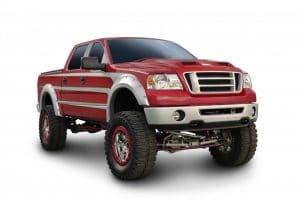The Risks of Driving Trucks and SUVs That Are Lifted
 Raising the height of a truck is a popular way to make a truck look great and increase the performance of the truck. There are many different ways to lift a truck or an SUV. Each way has its own pros and cons for how the truck looks and operates. Lifting the truck often requires new and larger tires. Unfortunately, lifting trucks also comes with safety risks that can affect the truck’s center of gravity, can affect other smaller vehicles that collide with it, and can affect visibility.
Raising the height of a truck is a popular way to make a truck look great and increase the performance of the truck. There are many different ways to lift a truck or an SUV. Each way has its own pros and cons for how the truck looks and operates. Lifting the truck often requires new and larger tires. Unfortunately, lifting trucks also comes with safety risks that can affect the truck’s center of gravity, can affect other smaller vehicles that collide with it, and can affect visibility.
The different kinds of lift kits
Allout Offroad promotes the following types of lifts. Other companies have similar variations:
- Aftermarket torsion keys. These lifts increase the height of the truck about 1 to 1.5 inches for trucks that have a torsion bar suspension. Torsion bars twist to adjust for the weight of the load instead of compressing “the way a coil spring compresses.”
- Leveling kits. These lifts can raise the height of the truck up to three inches. Some leveling kits “use steel spacers to raise the front of the truck so that it remains level with the back.” Other leveling lifts use U-bolts or blocks. They’re available for most every model and make of truck.
- Body lifts. These lifts can also increase truck height by up to three inches. They can be used for larger wheels. “They can add more height than leveling kits by themselves.” They increase the truck height by lifting the body of the truck from the truck frame.
- Premium lift systems. These lifts can raise a truck’s height by six inches. They’re “popular among truck lovers who want to use 35-inch off-road tires.”
Bigger tires can make for more comfortable rides especially with bigger loads. Generally, leveling lifts are used for truck drivers who drive on the main roads. The other lifts are generally used for off-road performance.
Why lifted vehicles are dangerous
Increasing the height of a truck or SUV and adding bigger tires affects truck driver control in the following ways:
- The change in height due to truck lifts increases the possibility the truck could roll over. Truck rollovers can affect traffic in two ways. Nearby drivers need to avoid the truck and they also need to avoid the cargo that spills from the truck. If they don’t’ avoid the truck or the cargo or strike other cars while attempting to steer free of the truck, they can suffer death or serious injuries. The drivers of the truck may die or suffer serious injuries too.
- Rear-end collisions. If the front of the truck is raised, that increases the danger to vehicles the truck may strike in the rear – because the front of the truck can ride up onto the car in front of the lifted truck instead of just striking the bumpers of the car in front. Rear-end collisions can cause whiplash and soft-tissue injuries.
- Different sight-lines. Trucks should be designed to minimize blind spots and increase visibility. Adding height to a truck changes the blind spots and sight-lines which can increase the odds of a crash.
- A reduced ability to stop. The larger trucks, larger wheels, and increased cargo weight make the trucks heavier – which makes them harder to stop.
Increasing truck height may also increase the height of the headlights – which can affect visibility as well.
According to Liftlaws.com, Oklahoma doesn’t have any lift laws. There are related laws though, regarding tires, the dimensions of the truck, and stopping distances, among others.
If you were injured in a truck collision or a loved one suffered a wrongful death due to a truck accident, the experienced Oklahoma City truck accident lawyers at Cunningham & Mears have the experience and resources to help you get justice. We’ve been fighting for truck accident victims and families for over 20 years. We demand that accountable truck drivers and trucking companies pay for your pain and suffering, medical expenses, lost income, disfigurement, wrongful death, vehicle damage, and other damages. To speak with a strong advocate, call our Oklahoma City office at 405.212.9234 or complete our contact form to schedule an appointment.
Ryan Y. Cunningham is a founding partner of Cunningham & Mears. Mr. Cunningham devotes his practice to protecting the rights of injured Oklahoma residents. In addition to assisting injured clients, Mr. Cunningham endeavors to improve personal injury representation by speaking on issues related to personal injury law to attorneys in continuing legal education courses and to law students. Learn More
